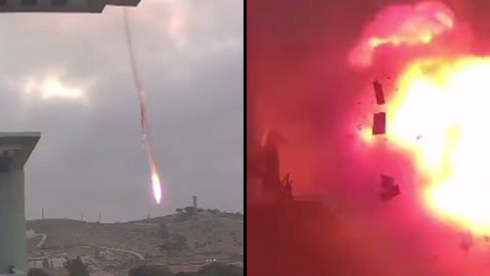“This was something I’d only ever experienced through the TV,” said Yogev Bodvika, whose home was destroyed. “But when it hits your own house, it shatters you to pieces.”
Footage from the missile strike
(Video: Jay Sverdlov)
Due to the direct hit, dozens of families were evacuated to the Leonardo Hotel at the Dead Sea and other temporary housing, adding to the hundreds displaced in other attack zones. “It’s insane,” said one resident. “Unbelievable. The distance between the road impact and the building was almost nothing.”
Bodvika, who lives in a nearby building, has been relocating since the attack. He and his family initially stayed with his parents. Later, the Be’er Sheva municipality arranged accommodations for them at a hotel on the Dead Sea, followed by accommodations in the city itself. A friend eventually offered his home, and they later moved into a rented apartment.
“We were disoriented,” Bodvika said of their time at the hotel. “I kept thinking about how to get back to Be’er Sheva and rebuild our lives. It’s a particularly challenging and complex ordeal. We didn’t take anything with us—we couldn’t go back to the apartment.”
Describing the night of the attack, he said: “We live in a penthouse. I took the kids and the dogs down to the basement level. My wife came down a few minutes after me. I don’t know how to describe the explosion—it was unreal. Then, smoke started pouring in through the doors. Everything blew up. I called the 100 emergency line, and the few minutes it took for a firefighter or policeman to arrive felt like an eternity. He shouted for us to get out—fast.”
The destruction after the missile strike
(Video: Yogev Bodvika)
Bodvika works in a staffing agency, and his wife is a homemaker. “The kids are completely shaken,” he said. “Our 12-year-old didn’t want to go home—he wanted to stay with his friend at the Leonardo Hotel. Our 14-year-old is sleeping in the same bed with us. The youngest, who’s 11, is just confused.”
He added, “Every siren since then has felt different. It’s a trauma I hope we can overcome. We have to rebuild everything. So far, the property tax authority hasn’t made our lives difficult, but still, we have nothing. The city sent two Home Front Command officers to retrieve medications and a few valuables, and that’s it. We’re nomads.”
Three other Israelis whose homes were damaged in the direct war with Iran spoke about their situation: Yulia Sokolov from Tel Aviv, Leah Abir from Bat Yam and Yehuda Elidi from Holon. They described the hardship they’ve endured, the destruction of their homes and the uncertainty they now face. While praising the generosity of fellow Israelis who have offered help and donations, they called on the state to step in: “They’re ignoring us. We’re not getting anything right now.”



